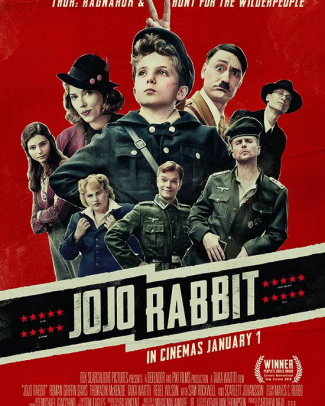Best new film of 2020? Has to be Jojo Rabbit!
OK: best new film “so far”. And seeing as we are not even one whole week into the New Year, that may not be an exceptionally high bar. But I suspect that verdict will still be standing three, six, twelve months from now. Because Jojo IS a remarkable film that pulls off the elusive triple of making us laugh, cry, and also think a little more about the subject before us than the average movie pot-boiler.
It is a film about a boy, aged 10, dealing with love, loss and growing up in the closing days of WWII. But this is no twee Hope and Glory! For the Jojo (Roman Griffin Davis) of the title is a fanatical young Nazi, with an imaginary friend called Adolf. That's Adolf Hitler (Taika Waititi), natch: a sort of cross between evil jiminy cricket and camp commentator.
Joining the Party
For Jojo, there can be no greater cause for celebration than the day he is inducted into local youth corps: there to learn about killing, hand grenades and anti-Semitism.
“Rabbit” is the somewhat scornful nickname he is awarded after he fails to show sufficient “manliness” and commitment by snapping the neck of a rabbit.
Bad taste? We've only just begun. For the whole of this film, in addition to being a black comic expose of the pointless horror of war is a debunking and take-down of the hatred at the heart of Nazi ideology. In Jojo's head, Jews are literal monsters, with horns and scaly skin, hidden in plain sight and dedicated to the destruction of the noble Aryan race.
Human? Or Nasty?
So what's a boy to do when it turns out there is a Jew, Elsa (Thomasin McKenzie), hiding in the attic of his house with the full knowledge of his own beloved mother (Scarlett Johansson)? His first thought, to run to the authorities, is a no-go. For as Elsa explains: if he denounces her, she will denounce his mother and....does he want to take the risk of his mum coming under suspicion.
In the end, an uneasy truce prevails. Jojo will allow Elsa to stay, simultaneously subjecting her to an intermittent and increasingly ridiculous inquisition on the nature of Judaism. And as is the way of such relationships, this one changes, as the two learn to trust one another and Jojo finds the props of his own philosophy knocked away one by one.
If that sounds awkward – not least the fact that this is the world as seen through the eyes of a boy desperate to be accepted as a Nazi – do not be put off. For this is a top to toe evisceration of Nazism – its pretensions, its illogicality, its inhumanity – carried out in the worst possible taste. Think Springtime for Hitler, out of Mel Brooks' The Producers, crossed with Armando Iannucci's Death of Stalin. And then some.
A Very Contemporary Film
There are reviews out there using the s-word to describe this film. I think that is not quite accurate: for “satire”, in my dictionary, is something a little more subtle: a little more directly connected to real people and events. Whereas Jojo Rabbit, apart from the broad backdrop of world war and Nazism is a bit more abstracted: a make-believe space, as refracted through the eyes of a ten-year old in which the essence of all of the above are to be found.
For which reason, do not come at me with your pedantries: the timeline of this film makes no sense at all. And that does not matter.
So no: this is not clever satire. It is brutal dissection, in a world populated with impossible caricatures. Rebel Wilson's sassy but psychotic Nazi mother: Sam Rockwell as jaded realist given the impossible task of defending his home town...and designing camp Ruritanian style uniforms for the day the Allies arrive; Stephen Merchant as a leeringly creepy SS Officer.
And it also brings the human to the fore: “You're not a Nazi, Jojo”, Elsa says, when he insists that he is: “You're a ten-year-old kid who likes dressing up in a funny uniform and wants to be part of a club”.
This is, of course, all about WWII. Nothing at all to do with modern day politics. No. Nothing at all!
It is funny, witty, with dialogue and one-liners that alternate between in-your-face slapstick and subtle. There is music. A clever juxtaposition of WWII imagery with more contemporary artists, including the Beatles and David Bowie. Dancing, as Scarlett Johansson plays into a role that will elicit much sympathy and go some way to win back some of the more diverse audiences with whom she has had issues of late.
And it is sad, insightful, tearful. A worthy first stab at political comedy by director Taika Waititi. To those already out there observing this is far too serious a subject for such gung ho humour, the film supplies its own answer, in the form of Hitler's advice to Jojo: “Let them say whatever they want.
“People used to say a lot of nasty things about me.”
It may be a little early to judge best film of the year. But even allowing for the fact that this is week one, Jojo Rabbit gets off to a great start.
Four and a half stars!


